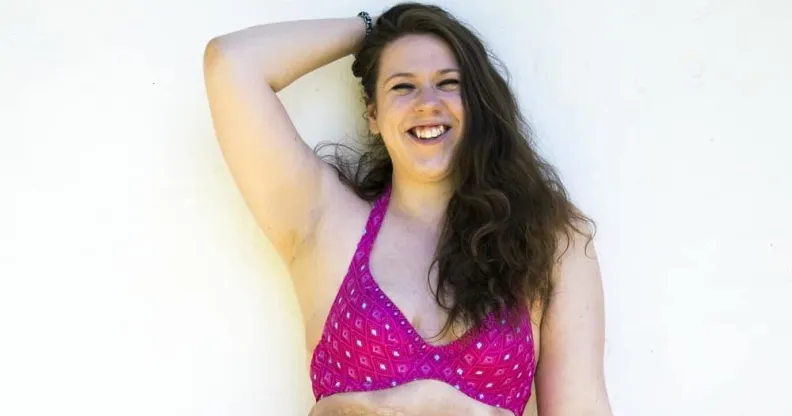Living with chronic illness: ‘I didn’t look in a mirror for five years’

Hannah is living with chronic illness
Living with chronic illness has “not been a linear path” but Hannah Shewan Stevens is learning to embrace being “queer and beautifully scarred.”
After being diagnosed with fibromyalgia and scleroderma, a rare autoimmune condition at just 14, Stevens’ relationship with her body broke down.
“At 14 I was dealing with scarring which seemed to be never-ending, which had a huge impact on my confidence as a teenager,” she tells PinkNews.
“I basically didn’t look in a mirror for five years or so, I just refused to acknowledge the condition existed which was both detrimental to my mental and physical health.”
As well as dealing with her health-related issues, Hannah was also struggling with dating and her sexuality, meaning her confidence was at an all-time low.
“I already felt different because of my health conditions and so it took a really long time to accept that my sexuality was anything outside of the norm,” she says.
“I just ignored it as I didn’t want to make myself even more of an ‘other.'”
Baring all
It wasn’t until she took part in a body-positive swimwear march that her relationship with her body started to improve.
“Once I bared all in public, and saw my skin from someone else’s perspective, I was able to let a lot of that self-hatred and shame go and embrace my scars one step at a time,” she explains.
“I think my relationship with my body and scars is still quite complicated.
“It’s not been a linear path and I don’t think it ever will be, but most of the time I’m able to enjoy, love and be proud of my body and where it’s got me.”
Stevens is now a champion for Changing Faces, a charity that campaigns to change public opinion and combat discrimination for those with a visual difference.
Disabled LGBT community
Stevens now also raises awareness through her work about the challenges that disabled individuals within the LGBT+ community face.
“Although it can sometimes feel like queer spaces aren’t made for us, queer spaces are made for everyone, whether you’re able-bodied or not,” she says.
“I think it’s really important that queer disabled people don’t suppress their queerness in an effort to stop othering themselves even more.
“It can feel like you’re already othered from society as a disabled person, but your queerness doesn’t make you more of an ‘other,’ it makes you included more into an even more beautiful space.”

